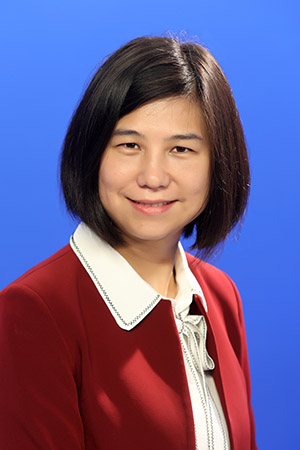
Ph.D.
Professor, Principal Investigator
Laboratory of Inflammation and Immune Regulation
Email: qiuju@sibs.ac.cn
Tel: 86-21-54923301
Research Areas
Innate lymphoid cells (ILC), which lack T and B cell antigen specific receptors, have recently been found to localize abundantly at the mucosal tissues and play important roles in inflammatory diseases. Using mouse genetic tools, mouse models of diseases, cellular and molecular techniques and bioinformatics analyses platforms, we aim to determine the molecular mechanisms that regulate the development and function of ILCs and the impact of ILCs on mucosal inflammation. Our research will provide potential strategies for the diagnosis and treatment of inflammatory diseases.
Brief Biography
Education Background
09/1999 – 07/2004: M.D., Taishan Medical University, Department of Clinical Medicine, Tai’an, China
09/2004 – 04/2009: Ph.D., Department of Immunology, Shanghai Jiao Tong University School of Medicine, Shanghai, China
Academic Background
2017 - Present: Professor, Principal Investigator, Shanghai Institute of Nutrition and Health, CAS
03/2014 – 12/2016: Professor, Principal Investigator, Institute of Health Sciences, Shanghai Institutes for Biological Sciences, Chinese Academy of Sciences and Shanghai Jiao Tong University School of Medicine
11/2009 – 03/2014: Research Associate, Department of Microbiology and Immunology, Department of Pathology, Feinberg School of Medicine, Northwestern University, Chicago, IL
05/2009 – 11/2009: Postdoctoral Fellow, Albert Einstein College of Medicine, New York, NY
09/2004 – 05/2009: Graduate Student, Shanghai Jiao Tong University, School of Medicine, China
07/2003 – 08/2004: Department of Immunology, Shanghai Jiao Tong University School of Medicine
Selected Publications (*Corresponding Author)
- Jupei Tang#, Hanxiao Sun#, Huidan Chang, Liyun Yuan, Yue Chen, Xueliang Zhang, Yongzhen Tao, Lifeng Yang, Zhen Shao, Xiaohuan Guo, Hong Zhou, Huiming Sheng, Qiang Zou, Xiao Su, Jinxin Qiu*, Jun Qin*, Ju Qiu*. Brg1-imprinted chromatin status controls the effector and memory ILC2 metabolism to exacerbate allergic lung inflammation. J Allergy Clin Immunol 2025 Sep 17:S0091-6749(25)00948-0. doi: 10.1016/j.jaci.2025.08.029
- Hanxiao Sun, Jinxin Qiu*, Ju Qiu*. Epigenetic regulation of innate lymphoid cells. Eur J Immunol 2024 Sep;54(9):e2350379 (invited review)
- Hanxiao Sun, Jie Shu, Jupei Tang, Yue Li, Jinxin Qiu, Zhaoyun Ding, Binbin Xuan, Minghui Chen, Chenxin Gan, Jinpiao Lin, Ju Qiu*, Huiming Sheng*, Chuanxin Wang*. GLP-1 receptor agonists alleviate colonic inflammation by modulating intestinal microbiota and the function of group 3 innate lymphoid cells. Immunology 2024 Jul;172(3):451-468
- Zhaoyun Ding#, Ting Cai#, Jupei Tang, Hanxiao Sun, Xinyi Qi, Yunpeng Zhang, Yan Ji, Liyun Yuan, Huidan Chang, Yanhui Ma, Hong Zhou, Li Li*, Huiming Sheng*, Ju Qiu*. Setd2 supports GATA3+ST2+ thymic-derived Treg cells and suppresses intestinal inflammation. Nat Commun 2022 Dec 3;13(1):7468
- Zhao Li#, Hanxiao Sun#, Zhitao Gu*, Ju Qiu*. Emerging roles of ILC2s in antitumor immunity. Cell Mol Immunol 2022 Nov;19(11):1311-1313
- Jinxin Qiu, Yanhui Ma*, Ju Qiu*. Regulation of intestinal immunity by dietary fatty acids. Mucosal Immunol 2022 May;15(5):846-856
- Jiali Chang, Xiaojuan Ji, Tian Deng, Jinxin Qiu, Zhaoyun Ding, Zhao Li, Yanhui Ma, Xiaoyu Hu, Li Li*, Ju Qiu*. Setd2 determines distinct properties of intestinal ILC3 subsets to regulate intestinal immunity. Cell Rep 2022 Mar 15;38(11):110530
- Jingjing Zhang#, Jinxin Qiu#, Wenyong Zhou, Jianping Cao, Xuefei Hu, Wenli Mi, Bing Su, Bin He*, Ju Qiu*, Lei Shen*. Neuropilin-1 mediates lung tissue-specific control of ILC2 function in type 2 immunity. Nat Immunol 2022 Feb;23(2):237-250
- Qiu J#, Zhang J#, Ji Y*, Sun H#, Gu Z, Sun Q, Bai M, Gong J, Tang J, Zhang Y, Li S, Shao Z, Li J, Sheng H*, Shen L*, Qiu J*. Tissue signals imprint Aiolos expression in ILC2s to modulate type 2 immunity. Mucosal Immunol 2021 Nov;14(6):1306-1322
- Qi X, Qiu J, Chang J, Ji Y, Yang Q, Cui G, Sun L, Chai Q, Qin J*, Qiu J*. Brg1 restrains the pro-inflammatory properties of ILC3s and modulates intestinal immunity. Mucosal Immunol 2021 Jan;14(1):38-52
- Deng T, Suo C, Chang J, Yang R, Li J, Cai T, Qiu J*. ILC3-derived OX40L is essential for homeostasis of intestinal Tregs in immunodeficient mice. Cell Mol Immunol 2020 Feb;17(2):163-177
- Li J#, Shi W#, Sun H, Ji Y, Chen Y, Guo X, Sheng H, Shu J, Zhou L, Cai T, Qiu J*. Activation of DR3 signaling causes loss of ILC3s and exacerbates intestinal inflammation. Nat Commun 2019 Jul 29;10(1):3371
- Ting Cai#, Jinxin Qiu#, Yan Ji, Wenjing Li, Zhaoyun Ding, Caixia Suo, Jiali Chang, Jingjing Wang, Rui He, Youcun Qian, Xiaohuan Guo, Liang Zhou, Huiming Sheng*, Lei Shen*, Ju Qiu*. IL-17-producing-ST2+ILC2 plays a pathogenic role in lung inflammation. J Allergy Clin Immunol 2019 Jan;143(1):229-244
- Ye J#, Qiu J#, Bostick JW, Ueda A, Schjerven H, Li S, Jobin C, Chen ZE, Zhou L. The Aryl Hydrocarbon Receptor Preferentially Marks and Promotes Gut Regulatory T Cells. Cell Rep 2017 Nov 21;21(8):2277-2290
- Suo C, Fan Z, Zhou L, Qiu J*. Perfluorooctane sulfonate affects intestinal immunity against bacterial infection. Sci Rep 2017 Jul 12;7(1):5166
- Ruomeng Qiu, Wenli Shi, Ting Cai, Siyu Pei, Ting Tang, Yafei Huang, Huan Wang, Liming Shao, Ju Qiu*, Yonghui Wang*. Design, synthesis and phenotypic evaluation of N-biaryl amides for IL-17A suppression. Med Chem Commun 2016;7(12):2344-2348
- Qiu J, Zhou L. Aryl hydrocarbon receptor promotes RORγt(+) group 3 ILCs and controls intestinal immunity and inflammation. Semin Immunopathol 2013 Nov;35(6):657-670
- Qiu J, Guo X, Chen ZM, He L, Sonnenberg GF, Artis D, Fu YX, Zhou L. Group 3 innate lymphoid cells inhibit T-cell-mediated intestinal inflammation through aryl hydrocarbon receptor signaling and regulation of microflora. Immunity 2013 Aug 22;39(2):386-399
- Qiu J, Heller JJ, Guo X, Chen ZM, Fish K, Fu YX, Zhou L. The aryl hydrocarbon receptor regulates gut immunity through modulation of innate lymphoid cells. Immunity 2012 Jan 27;36(1):92-104


